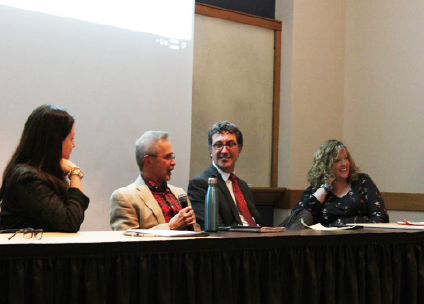
By Laura Null & Francis Abbamonte
Staff Writers
Last Wednesday night the Department of Communication hosted an event in Beers Lecture Hall titled, “Civic and Civil Communication in the Current Age: How Are We Talking to Each Other These Days?”.
Introduced by Rob McKenzie Ph.D., Chairperson and Professor for the Department of Communication, it was described how human communication and interaction has changed overtime referring back to Ancient Greek history.
“Something is happening with our speech that is very different.” said McKenzie.
He continued by explaining that, people are expected to be nice and reasonable with each other when speaking to one another.
Additionally, McKenzie described everyone being at the discussion stating, “We’re here because we believe something is happening, because speech is changing.”
The next speaker was Margaret Mullan, Ph.D., a professor sharing her research focusing on the online aspect of communication.
She proposed a rhetorical question to the audience saying, “does civility even exist?” Mullan was referring to online conversation and questioning if communication can happen in a civil way on social media outlets.
She also mentioned statistics of people’s perspectives when it comes to the topic of civility.
Mullan said, “We don’t want to silence perspectives”, adding that people must, “foster respect for all.”
Mullan explained, that when using social media outlets, we are unaware if we are disrespecting someone online compared to having face to face conversations.
She further discussed how specific topics online such as religion, race, class and politics can get complicated and tend to be avoided.
Then, Mullan explained that people often do not take the time to try to understand another person’s comments and instead just react. Mullan concluded that as a community people should not try to win an argument for the sake of winning, but find a space to share one’s opinions.
Next, Charles Warner, Ph.D., who is also a professor, focused on the topic of political communication.
Warner referred back to a previous course he taught in the fall of 2016 during the presidential election between Donald Trump and Hillary Clinton. Describing his class he said, “We have a youth demographic that will prevail…students.”
Warner explained that based on his observation during the course he felt that it was an, “Even split among students with Clinton and Trump”. Also, Warner described an even split between both male and female students for both Clinton and Trump.
Warner described his class discussions on political communication as being lively, but noted that students were civil within the classroom.
Additionally, he explained that Clinton was viewed as having a more civil demeanor in the debates and in the media, while Trump was viewed as uncivil.
However, those students that liked Trump’s uncivil demeanor took him has honest.
“Strong leaders are liked, weak leaders are disliked.” said Warner. From Warner’s class response, Hillary Clinton lost the election because “she didn’t act, she lost.” He further explained that civility played a role in why Clinton lost and incivility is why Trump won.
The last panelist that spoke was Cem Zeytinoglu, Ph.D., also a professor, who focused on the communication of immigration. Zeytinoglu had described his personal background being an immigrant himself from Turkey and later becoming an American citizen.
Zeytinoglu described American people as being a part of a nation, but not necessarily close.
When he described being from Turkey, he described everyone from there as Turkish, everyone has a Turkish ethnicity.
Zeytinoglu explained, America as having an idea of a nation based off the constitution, “living together because of common principals.” Although, Americans do not have common ancestry, they do have a common history of people coming from different parts of the world based on ideals.
“People come from everywhere and they become Americans.” said Zeytinoglu. He described America as a union stating, “This union is not a perfect union, but has the capacity to be.”
Following the three panelists Mullan, Warner and Zeytinoglu, Andi McClanahan, Ph.D., who is a professor, opened up the floor to questions and discussion about the forum.
Students gave their feedback on the topics and asked the panelists questions based on their own segments and other aspects of communication between one another.
The discussion ended at 9 p.m., leaving those who attended the panel informed about civic and civil communication in the current age.
Email Laura at:
lnull@live.esu.edu
Email Francis at:
fabbamonte@live.esu.edu

